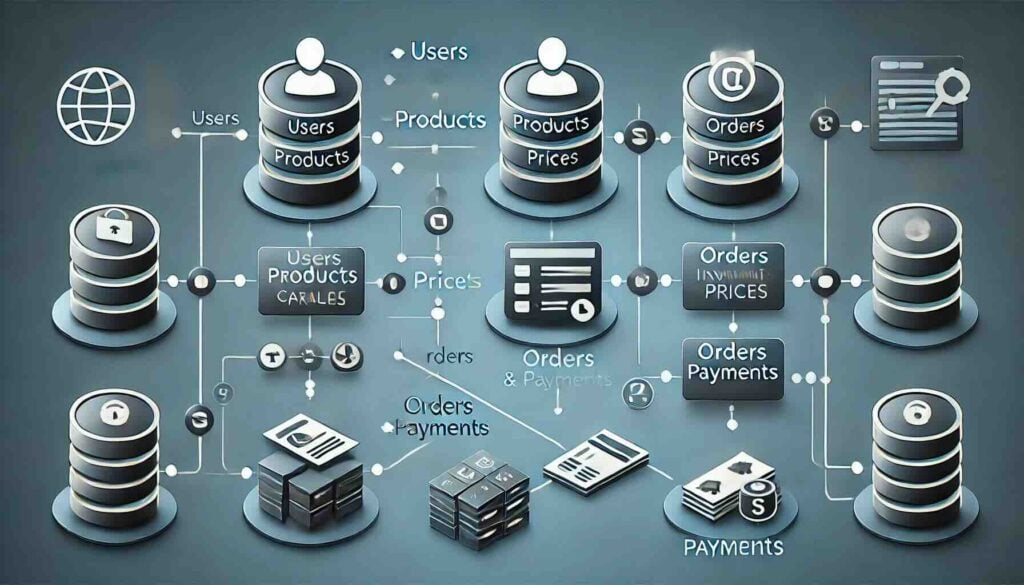
Introducing a B2B eCommerce experience for an existing customer base
Many B2B companies have built their operations around complex systems that store customer data, pricing, and product information in different databases.
When these companies want to add online ordering, they usually face a painful choice: either move all their data to a new eCommerce system, or build complicated connections between their existing databases and the new system.
But there’s a simpler way.
Since Spree Commerce is built on Ruby on Rails, it can directly connect to your existing databases thanks to Rails’ built-in multiple database support.
This means you can add modern online ordering without moving your data or building complex integrations – Spree simply reads and writes to your existing databases as if they were its own.
The Technical Integration Challenge
Traditional B2B operations often rely on complex IT ecosystems built over decades. These typically include:
- Enterprise Resource Planning (ERP) systems managing inventory and operations
- Customer Relationship Management (CRM) databases containing detailed client histories
- Complex product catalogs with customer-specific variations
- Sophisticated pricing structures including custom price lists
- Various payment terms and discount arrangements
- Multiple integration points with legacy systems
The prospect of integrating a new eCommerce platform into this environment can seem daunting. Common concerns include data synchronization, system performance, and maintaining existing business logic while adding new capabilities.
The Business Process Challenge
Beyond technical integration, B2B eCommerce must accommodate sophisticated business requirements:
- Organization-specific pricing and product availability
- Multi-level approval workflows for purchases
- Role-based permissions and access controls
- Complex order management processes
- Customer-specific payment terms and credit limits
- Custom catalogs and pricing structures per organization
These requirements often make standard B2C eCommerce platforms insufficient for B2B needs, while enterprise B2B solutions can be overwhelming in their complexity and cost.
The Spree Commerce Solution
Spree Commerce offers a refreshing approach to these challenges. Instead of requiring a complete system overhaul, it provides a lightweight, adaptable solution that can be seamlessly integrated into existing infrastructure. Here’s how:
Technical Integration Made Simple
Spree leverages Ruby on Rails’ multiple database support to connect directly with existing customer databases. This approach:
- Eliminates the need for complex API integrations
- Maintains data consistency across systems
- Reduces implementation time and cost
- Minimizes risk of data synchronization issues
- Allows for gradual feature rollout
Business Process Alignment
The platform provides built-in support for B2B-specific requirements:
- Customer-specific pricing and catalog management
- Robust role and permission systems
- Configurable approval workflows
- Integration with existing business rules
- Flexible payment terms handling
Success in Action: The 3form Story
A prime example of successful B2B eCommerce integration is 3form, a leading architectural materials manufacturer. Their implementation of Spree Commerce demonstrates how companies can modernize their sales channels while maintaining existing business processes.
3form achieved:
- Seamless integration with their existing customer database
- Preservation of complex pricing structures
- Implementation of sophisticated product sample ordering
- Maintenance of customer-specific catalogs and pricing
- Improved customer satisfaction through self-service capabilities
Key Takeaways
The transition to B2B eCommerce doesn’t have to be disruptive. With the right approach and technology:
- Existing IT investments can be preserved and enhanced
- Business processes can be digitized without being reinvented
- Customer relationships can be strengthened through improved service
- Implementation can be iterative and manageable
The key is choosing a solution that adapts to your business, rather than forcing your business to adapt to the solution. Spree Commerce’s approach demonstrates that B2B eCommerce integration can be both powerful and practical.
With proper planning and the right technology partner, B2B companies can embrace digital commerce while maintaining the complex relationships and processes that drive their business success.
B2B eCommerce FAQ: Buyer experience
Can I offer different levels of access and permissions for my current clients?
Yes. Spree Commerce enables role-based access control for B2B buyers. Existing customers can be grouped under buyer organizations with defined permissions for purchasing, approvals, and financial management.
How do I personalize the B2B experience for each customer segment?
Spree Commerce allows custom catalog and pricing segmentation, letting you define unique product assortments, payment terms, and price lists for each existing client or business group.
Can I maintain existing relationships while automating ordering processes?
Yes. Spree Commerce automates bulk and recurring B2B ordering workflows, allowing repeat buyers to quickly reorder from previous transactions while keeping personalized account management in place.
How do I encourage my long-term customers to adopt the new digital platform?
You can use buyer-focused self-service tools such as personalized dashboards, saved order templates, and transparent order tracking to simplify the buying process and improve loyalty among existing clients.
Can I integrate the new B2B portal with my current CRM or ERP system?
Spree Commerce supports API-driven integrations with ERP systems. You can synchronize customer data, pricing, and order histories to maintain consistent experiences across digital and offline touchpoints.
How can I measure the impact of moving existing customers online?
With advanced B2B analytics and reporting tools, Spree Commerce tracks customer engagement, order frequency, and average order value, helping you optimize digital adoption and sales performance.



